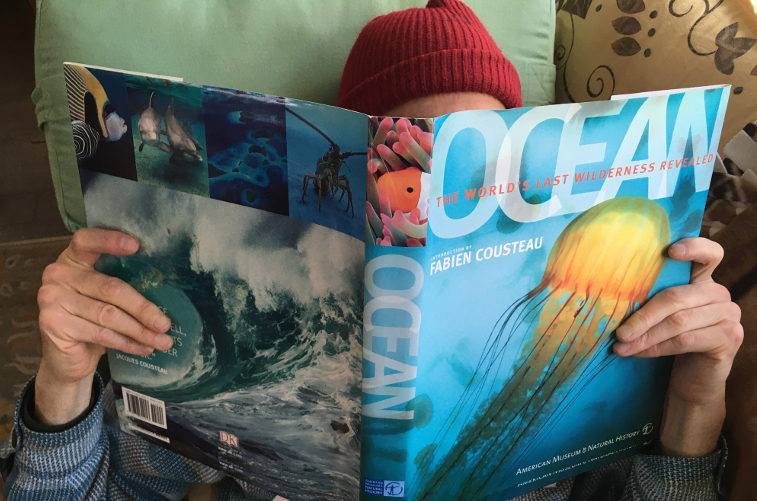One weekend during my first year in grad school I had my typewriter set up on the dining room table at my mom’s place. The year before had been rocky. I’d lost my dad whose interests in science and nature had such a huge impact on my own. I was flailing a bit. I felt I needed guidance. What came was this:
Making do with what you have is good.
Making do without is better.
Making with what you do is the next step.
Doing with what you make is supreme.
I jotted it down in my notebook. I thought it was a clever play on words. But it’s held up surprisingly well as a guide to negotiating life on this planet.
The first three lines should be intelligible enough:
Making do with what you have is good – Live conservatively.
Making do without is better – Simplify, when possible.
Making with what you do is the next step – Create value.
But it’s this last item – Doing with what you make is supreme – that continues to most hold my fascination. What it means is: apply the value you create to yet higher purposes.
In some ways, this is common sense. If you make a healthy pot of soup for yourself or your family from scratch, using carefully sourced, high-quality ingredients, that’s wonderful! Amazing! However, if you share it more broadly, say at a potluck, that can have correspondingly broader impacts. Someone might come up to you and say, “Wow! My children loved this! Can I have the recipe?”
All of a sudden, by taking that single step of sharing, the use value of a humble pot of soup can be expanded exponentially. Next thing you know, that nutritious soup might become a mainstay in another family’s weekly meals. Children’s taste preferences may be shaped by that experience, influencing their other food choices over the course of their lives. These children may in turn grow up and continue feeding real foods to their own children. Or the positive response to the first recipe may inspire other dietary changes at home. Or someone who tastes something real that is made with love may at some point be inspired to open a restaurant, affecting the lives of thousands. Or teach. Or farm. Or become a chef. Or advocate for food policy.
My working hypothesis is that positive use values need little urging to propagate omnidirectionally in this way. We may not know exactly how it will all work out, but positive things tend to lead in positive directions. I’ve seen this happen and I’ve written about it in this piece published by Resilience.org in 2016. We don’t have to make a big struggle of it: we just have to bring our soups to the potluck — and I encourage you to take that both literally and metaphorically.
But the even bigger thing is: when this path is pursued with intent, the impact of our actions can be catalyzed exponentially once again.
I offer this now because, my friends, this is a particularly good moment in history for exponentially propagated positive developments. In simple terms: Doing good in the world.
My favorite example of the manifold impact of intent-driven “doing with what you make” is Jacques Yves Cousteau (1910-1997). Cousteau was the noted oceanographer who co-invented (with Emile Gagnan) the Aqua-Lung self-contained underwater breathing apparatus or SCUBA, among many other accomplishments and innovations. He’s arguably the most influential oceanographer of all time.
When I was a child in the 1960s and 70s, my dad and I used to love watching The Undersea World of Jacques Cousteau on TV. Looking back, though I didn’t really think of it as a child, my dad was doing something similar, working with a of engineers and technicians to invent new kinds of steel that could do things other steels couldn’t, steels that could then be made into tools that expanded human capacities.
So consider: Cousteau and Gagnan invented the SCUBA in the early 1940s. That’s huge in itself; anybody else might call that single accomplishment plenty for a lifetime. But Cousteau then uses his SCUBA invention to explore previously unknown parts of the planet. Seeing what was down there, he then decided he simply had to share it with the world. Working with others, he developed a series of underwater cameras that in turn enabled him to bring his discoveries to global audiences. This in turn had enormous impacts on public awareness and ocean conservation policies, and ramified into further effects ranging from the sciences to eco-tourism.
Cousteau’s accomplishments continue to reverberate around the world. Take a look at this impressive timeline.
Further, speaking as a person with my toes hanging over the edge of old age, I’m amazed to do the math and realize how old Cousteau already was when I was first watching him curl backwards off the decks and into the unknown wearing his SCUBA gear, fins and wetsuit, cameras rolling. And he just kept right on going.
So you see the impact of what can happen with “doing with what you make.” I’m living it right now by sharing my 4-point recipe in this essay. Consider this my potluck contribution.
I encourage you to take a look at your gifts, inventions, ideas, dreams and talents. How can you do what Cousteau did and use them to open new worlds for yourself and others?
Think about it. Try stuff. It’s time to dive in.
Photo: Claire Maitre






